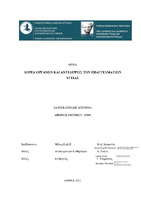| dc.contributor.advisor | Stamouli, Maria-Aggeliki | |
| dc.contributor.author | Χατζηκωστάκη, Δέσποινα | |
| dc.date.accessioned | 2021-07-09T10:10:26Z | |
| dc.date.available | 2021-07-09T10:10:26Z | |
| dc.date.issued | 2021-07 | |
| dc.identifier.uri | https://polynoe.lib.uniwa.gr/xmlui/handle/11400/752 | |
| dc.identifier.uri | http://dx.doi.org/10.26265/polynoe-603 | |
| dc.description.abstract | Εισαγωγή: Η δωρεά οργάνων αποτελεί δώρο ζωής από έναν άνθρωπο, είτε ζώντα είτε εγκεφαλικά νεκρό σε έναν άλλο συνάνθρωπο ο οποίος πάσχει από ανεπάρκεια κάποιου οργάνου. Παρόλο που τον εικοστό αιώνα η επιστήμη εξελίχθηκε στον τομέα της μεταμόσχευσης ο μικρός αριθμός των δοτών δεν δύναται να καλύψει τις υπάρχουσες ανάγκες. Ο ρόλος των επαγγελματιών υγείας είναι ζωτικής σημασίας καθώς μπορούν να συνεισφέρουν στην ενημέρωση των πολιτών και να συντελέσουν στην αύξηση των διαθέσιμων οργάνων για δωρεά. Σκοπός: Σκοπός της παρούσης έρευνας είναι η διερεύνηση των αντιλήψεων των επαγγελματιών υγείας των Κέντρων Υγείας της 1ης Υγειονομικής Περιφέρειας της Αττικής σχετικά με τη δωρεά οργάνων.
Μεθοδολογία: Διεξήχθη ποσοτική έρευνα και για την συλλογή των δεδομένων χρησιμοποιήθηκε ερωτηματολόγιο κλειστού τύπου. Για τη στατιστική ανάλυση χρησιμοποιήθηκε το λογισμικό SPSS 25.0. Αποτελέσματα: Η συντριπτική πλειοψηφία των ερωτηθέντων θεωρεί ότι υπάρχει έλλειψη οργάνων και οι παρούσες ανάγκες για μεταμόσχευση οργάνων δεν καλύπτονται πλήρως. Θετική διάθεση, ως προς τη δωρεά οργάνων, δήλωσε το 85% των συμμετεχόντων ενώ αρνητική διάθεση το 12% των συμμετεχόντων. Κάρτα δωρητή οργάνων έχει το 3.3% των ερωτηθέντων ενώ σχεδόν το 45% δήλωσε ότι δεν θα επιθυμούσε να έχει. Το 87.79% των ερωτηθέντων επιθυμεί καλύτερη ενημέρωση για τη δωρεά οργάνων. Συμπεράσματα: Η μελέτη μας αποκάλυψε πως οι επαγγελματίες υγείας πιστεύουν πως έχουν μέτρια ενημέρωση σχετικά με τη δωρεά οργάνων και το μεγαλύτερο ποσοστό επιθυμεί να έχει καλύτερη ενημέρωση. Επίσης το μεγαλύτερο ποσοστό δήλωσε ότι δεν θα επιθυμούσε να έχει κάρτα δωρητή οργάνων ενώ ένα στα είκοσι άτομα δήλωσε πως δεν θα γινόταν δωρητής κανενός οργάνου. Από την έρευνα μας διαφαίνεται πως είναι επιτακτική η εκπαίδευση και η ενημέρωση των επαγγελματιών υγείας σχετικά με το θέμα της δωρεάς οργάνων καθώς είναι επιφυλακτικοί, σχεδόν αρνητικοί απέναντι στη δωρεά οργάνων. Το γεγονός αυτό αποτελεί ανασταλτικό παράγοντα στην αύξηση των διαθέσιμων οργάνων για μεταμόσχευση. | el |
| dc.format.extent | 105 | el |
| dc.language.iso | el | el |
| dc.publisher | Πανεπιστήμιο Δυτικής Αττικής | el |
| dc.rights | Αναφορά Δημιουργού - Μη Εμπορική Χρήση - Παρόμοια Διανομή 4.0 Διεθνές | * |
| dc.rights.uri | https://creativecommons.org/licenses/by-nc-sa/4.0/deed.el | * |
| dc.subject | Δωρεά οργάνων | el |
| dc.subject | Μεταμόσχευση | el |
| dc.subject | Επαγγελματίες υγείας | el |
| dc.subject | Organ donation | el |
| dc.subject | Transplantation | el |
| dc.subject | Health professionals | el |
| dc.subject | Γνώσεις | el |
| dc.title | Δωρεά οργάνων και αντιλήψεις των επαγγελματιών υγείας | el |
| dc.title.alternative | Organ donation and perceptions of health professionals | el |
| dc.type | Μεταπτυχιακή διπλωματική εργασία | el |
| dc.contributor.committee | Γούλα, Ασπασία | |
| dc.contributor.committee | Πιερράκος, Γεώργιος | |
| dc.contributor.faculty | Σχολή Διοικητικών, Οικονομικών & Κοινωνικών Επιστημών | el |
| dc.contributor.department | Τμήμα Διοίκησης Επιχειρήσεων | el |
| dc.contributor.master | Διοίκηση και Διαχείριση Υπηρεσιών Υγείας και Κοινωνικής Φροντίδας | el |
| dc.description.abstracttranslated | Introduction: Organ donation is a gift of life from one person, either alive or dead to another human being who suffers from organ failure. Although in the twentieth century science has evolved into the field of transplantation the small number of donors cannot meet the existing needs. The role of health professionals is vital as they can contribute to informing the public and also can help to increase the number of available organs for donation. Purpose: The aim of the research is to investigate the knowledge and attitudes of healthcare professionals of the Health Centers of the 1st Health District of Attica regarding the donation of organs.
Methodology: A quantitative research was carried out and a closed-ended questionnaire was used for data collection. For the statistical analysis was used SPSS 25.0 software. Results: The vast majority of respondents believe that there is a shortage of organs and the current needs for organ transplantation are not fully met. 85% of the participants stated a positive attitude regarding the organ donation, while 12% of the participants stated a negative attitude. 3.3% of respondents have an organ donor card while almost 45% said they would not like to have one. 87.79% of respondents want better information about organ donation.
Conclusions: Our study revealed that health professionals believe that they are moderately informed about organ donation and the higher percentage want to be better informed. Also the largest percentage stated that they would not like to have an organ donor card while one in twenty people stated that they would not become an organ donor. Our research shows that it is imperative to educate and inform health professionals about the issue of organ donation as they are cautious, almost negative towards organ donation. This is an inhibitory factor in increasing the number of organs available for transplantation. | el |


